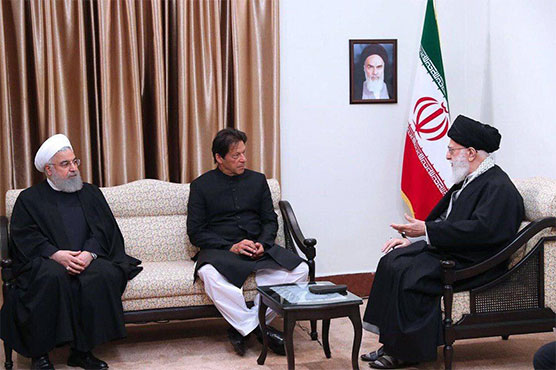Pakistani Prime Minister Imran Khan with Iran’s Supreme Leader and President Hassan Rouhani, April 22, 2019
Originally published by Arab News Pakistan:
Pakistan’s relationship with its western neighbor Iran was exceptionally cordial under the regime of the Shah, but since the 1979 Islamic Revolution, bilateral ties have cooled. This downturn has been spurred by a changing regional situation which has affected State security and strategic interests, and by a political identity in flux in both countries.
A core concern has been law and order in border areas. After the downfall of the Shah’s regime in 1979, the Iranian province of Sistan-Baluchestan and Pakistan’s southwestern province of Balochistan have faced violence along their shared frontier, with Baloch insurgents on both sides attacking State security apparatuses.
The cross-border violence undermined bilateral ties. Iranian authoritiesrepeatedly accused Pakistan of harboring Iranian insurgents belonging to Jundallah and Jaish Al-Adl, often without providing significant evidence. Pakistan responded with emphasis upon the need for bilateral security cooperation. In 2010, Iran arrested Jundallah’s chief Abdolmalek Rigi, apparently with the help of Pakistan’s security institutions. Despite this, Iranian circles have preferred an aggressive approach towards Pakistan and its security establishment.
In Pakistani Balochistan, an insurgency has been waged by Baloch separatist organizations since 2006. They and sectarian groups have targeted both security forces and civilians. although these lost momentum, Pakistani authorities see a deliberate campaign orchestrated by the Indian intelligence agency Research and Analysis Wing to destabilize Balochistan and unsettle law and order.
The perceived threat is heightened by the initiation of the China-Pakistan Economic Corridor — a $62 billion infrastructure project that is part of Beijing’s Belt and Road initiative, with Balochistan’s port of Gwadar in Balochistan as a regional trade hub. This was compounded by the arrest in 2015 of an Indian intelligence operative, Kulbhushan Yadav, as he entered Pakistan from Iran.
See also Who is Winning the “Great Balancing Game” Between Pakistan, India, Saudi Arabia, and Iran?
Enter Imran and Deadly Border Attacks
When Imran Khan’s Government took office in Islamabad in October, it emphasized the need to improve ties with neighboring countries, and Iranian Foreign Minister Jawad Zarif soon visited. But Tehran did not approve of attempts by Imran to strengthen ties with Saudi Arabia. The unease grew when 27 Iranian Revolutionary Guards personnel were killed in a bombing near the Pakistan border in February.
Among Iranian officials and media, a campaign castigated Islamabad for inaction against insurgents. Guards commander Maj. Gen. Mohammad Ali Jafari, blaming Saudi Arabia and the UAE for sponsoring the attacks, accused Pakistan’s security circles of supporting and harboring terrorists and threatened Islamabad with grave consequences.
Earlier this month, 14 Pakistan army personnel were taken from buses and killed near the coastal town of Ormara in Pakistani Balochistan. Baloch Raji Aajoi Saangar, a newly-formed umbrella group, claimed responsibility. Pakistan demanded “visible” action from Iran against the “terror outfits”, as suspicion grew that Jafari was signalling an Iranian blind eye towards attacks supported by Indian intelligence networks.
Imran’s Gambit
Last week Imran visited Iran, accompanied by his intelligence chief. In a significant concession, the Prime Minister acknowledged the use of Pakistani soil by militant groups targeting Iran. Despite this, the Islamic Republic remained silent on the Ormara attack and any operations by Indian intelligence operatives.
Imran and Pakistan’s security hierarchy have decided that engagement is preferable to confrontation. It has eschewed the anti-Iran initiative of regional states, balancing the Government’s embrace of Saudi Crown Prince Mohammad bin Salman and Riyadh’s $20 billion injection into the Pakistan economy.
Imran, MBS, and Money Forge a Pakistan-Saudi Strategic Partnership
But will this leap of faith work? The jury is still out — or rather it is sitting in the Supreme Leader’s office in Tehran.

